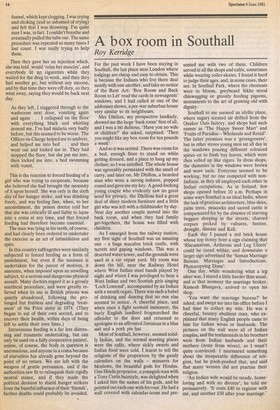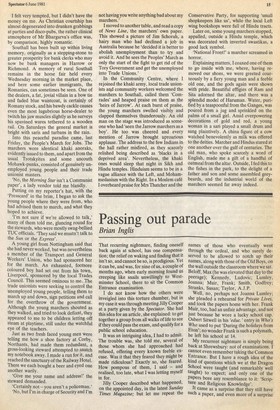A box room in Southall
Roy Kerridge
For the past week I have been staying in Southall, the last place near London where lodgings are cheap and easy to obtain. This is because the Indians who live there deal mostly with one another, and take no notice of the Rent Act: 'Box Room and Back Room to Let' read the cards in newsagents' windows, and I had called at one of the addresses shown, a pre-war suburban house very similar to its neighbours.
Mrs Dhillon, my prospective landlady, showed me the large 'back room' first of all, and I was a bit dubious. 'Have you no wife or children?' she asked, surprised. 'Then you might like my box room for ten pounds a week'.
And so it was settled. There was room for a bed, enough floor to stand on while getting dressed, and a place to hang up my clothes; so I was satisfied. The whole house was agreeably permeated with the smell of curry, and later on, Mr Dhillon, a bearded man who wore a sarong indoors, popped round and gave me my key. A good-looking young couple who evidently saw no great need for privacy, the Dhillons had a great deal of shiny modern furniture and a little girl who was left with a childminder by day. Next day another couple moved into the back room, and when they had family get-togethers, the house was filled with children.
As I emerged from the railway station, my first sight of Southall was an amazing one — a huge macabre brick castle, with turrets and gaping windows. This was a deserted water tower, and the grounds were used as a car repair yard. My room was down the hill, near the Railway Hotel where West Indian steel bands played by night and where I was privileged to hear a West Indian and two Scottish girls singing 'Loch Lomond', accompanied by an Indian with a mouth organ. There was such a babel of drinking and dancing that no one else seemed to notice. A cheerful place, and when once a fight seemed imminent, the burly English landlord frogmarched the offender to the door and returned to apologise to an affronted Jamaican in a blue suit and a pork pie hat.
Most of Southall, however, seemed solidly Indian, and the normal meeting places were the cafés, where sickly sweets and Indian food were sold. I learnt to tell the religions of the proprietors by the gaudy calendars on the walls — minarets for Moslems, the beautiful gods for Hindus. One Hindu proprietor, a youngish man with a Tony Curtis hairstyle, was delighted when I asked him the names of his gods, and he pointed out each one with fervour. He had a wall covered with calendar-icons and pre sented me with two of them. Children served in all the shops and cafés, sometimes while wearing roller-skates. I found it hard to judge their ages, and, in some cases, their sex. In Southall Park, where the chestnuts were in bloom, greybeard Sikhs stood chinwagging or gravely feeding pigeons, monuments to the art of growing old with dignity.
Southall to me seemed an idyllic place, where sugary scented air drifted from the Quaker Oats factory, and shops had such names as 'The Happy Sweet Mart' and 'Fruits of Paradise—Wholesale and Retail'. The latter premises was a 'greengrocers', but in other stores young men sat all day in the windows pouring different coloured spices on to fresh bay leaves, which were then rolled up like cigars. In dress shops, the dummies in the windows were brown and wore saris. Everyone seemed to be working, but no one competed with nonIndians, as they all employed each other in Indian occupations. As in Ireland, few shops opened before 10 a.m. Perhaps in some ways Southall is an ideal India, where the lack of gracious architecture, blue skies, palm trees, peacocks and sacred cattle is compensated for by the absence of starving beggars sleeping in the streets, charred corpses pecked by vultures, famine, drought, disease and Kali.
Each day I passed a red brick house whose top storey bore a sign claiming that 'Rheumatism, Arthrosis and Leg Ulcers' could be cured within; and downstairs a larger sign advertised the `Suman Marriage Bureau. Marriages and Introductions. Photocopying Done'.
One clay, while wondering what a leg ulcer was, I stared a little harder than usual, and at that moment the marriage broker, Ramesh Bhargava, arrived to open his shop.
'You want the marriage bureau?' he asked, and swept me into his office before I had time to collect my wits. He was a cheerful, bouncy ebullient man, who explained that many English people came to him for Indian wives or husbands. The pictures on the wall were all of Indian couples, and the testimonials in his brochure were from Indian husbands and their mothers (none from wives), so I wasn't quite convinced. I murmured something about the insuperable difference of religion, but he pooh-poohed that, and said that many women did not practise their religion.
'An Indian wife would be steady, homeloving and with no divorce', he told me persuasively. 'It costs £40 to register with me, and another £50 after your marriage.' I felt very tempted, but I didn't have the money on me. As Christian courtship has almost degenerated into drunken grabbings at parties and disco-pubs, the rather clinical atmosphere of Mr Bhargarva's office was, by comparison, highly romantic.
Southall has been built up within living memory, originally as a stepping-stone to greater prosperity for bank clerks who may now be bank managers in Harrow or Richmond. A memory of rural Southall remains in the horse fair held every Wednesday morning in the market place, and here some earlier immigrants, the Romanies, can sometimes be seen. One of the dealers, a fat, jovial villain in a bow tie and faded blue waistcoat, is certainly of Romany stock, and his bawdy cackle causes even the most lugubrious horse-dealer to twitch his jaw muscles slightly as he surveys his spavined wares tethered to a wooden rail. On Saturdays the general market is bright with saris and turbans in the rain.
Into this peaceful paradise came, last Friday, the People's March for Jobs. The marchers wore identical khaki anoraks, evidently issued to them, and apart from the usual Trotskyites and some uncouth Mohawk-punks, consisted of genuinely unemployed young people and their trade unionist masters.
'No, the Morning Star isn't a Communist paper', a lady vendor told me blandly.
Putting on my reporter's hat, with the 'Presscard' in the brim, I began to ask the young people where they were from, who had advised them to march, and what they hoped to achieve.
'I'm not sure if we're allowed to talk,' many of them told me, glancing round for the stewards, who were mostly swag-bellied TUC officials. 'They said we mustn't talk to the Sun or the Express'. A young girl from Nottingham said that she had never worked, but was nevertheless a member of the Transport and General Workers' Union, who had sponsored her for the march. An exhausted, footsore coloured boy had set out from his town, Liverpool, sponsored by the local Trades Council. This seemed ominous to me. The trade unionists were seeking to control the unemployed young people, telling them to march up and down, sign petitions and call for the overthrow of the government. Although the young marchers shouted as they walked, and tried to look defiant, they appeared to me to be children letting off steam at playtime, still under the watchful eye of the teachers.
Just as two fresh faced young men were telling me how a shoe factory at Corby, Northants, had made them redundant, a gross-looking steward attempted to snatch my notebook away. I made a run for it, and reached the sanctuary of the Railway Hotel. There we each bought a beer and eyed one another warily.
'Give me your name and address!' the steward demanded.
'Certainly not you aren't a policeman.' `No, but I'm in charge of Security and I'm not having you write anything bad about my marchers.'
I moved to another table, and read a copy of News Line, the marchers' own paper. This showed a picture of Jim Schorah, a hairy man who had declined a job in Australia because he 'decided it is better to abolish unemployment than to try and avoid it. And he sees the Peoples' March as only the start of the fight to get rid of the Tory Government and get the unemployed into Trade Unions.'
In the Community Centre, where I rejoined the khaki army, local trade unionists and community workers welcomed the marchers to Southall, called them 'Comrades' and heaped praise on them as the 'heirs of Jarrow'. At each burst of praise, the young marchers swelled visibly and clapped themselves thunderously. An old man on the stage was introduced as someone who had 'seen the Jarrow marchers as a boy'. He too was cheered and every mention of Jarrow brought uproarious applause. The address to the few Indians in the hall rather misfired, as they scarcely relished being described as 'blacks in a deprived area'. Nevertheless, the khaki ones would sleep that night in Sikh and Hindu temples. Hinduism seems to be in a vague alliance with the Left, and Mohammedanism with the Right. In a Moslem café I overheard praise for Mrs Thatcher and the Conservative Party, for supporting 'small shopkeepers like us', while the local Left wing bookshops were full of Hindu tracts.
Later on, some young marchers stopped, appalled, outside a Hindu temple, which was decorated with inverted swastikas, a good luck symbol.
'National Front!' a marcher screamed in horror.
Explaining matters, I coaxed one of them to go inside with me, where, having removed our shoes, we were greeted courteously by a fiery young man and a feeble old one, and the gods again were shown with pride. Beautiful effigies of Ram and Sita adorned the altar, and there was a splendid model of Haruman. Water, purified by a teaspoonful from the Ganges, was poured from a jug and sprinkled on the palms of a small girl. Amid overpowering decorations of gold and red, a young woman in a sari played a small drum and sang plaintively. A china figure of a cow watched benevolently as milk was offered to the deities. Marcher and Hindus stared at one another over the gulf of centuries. The old man, who spoke scarcely a word of English, made me a gift of a handful of oatmeal from the altar. Outside, I fed this to the fishes in the park, to the delight of a father and son and some assembled greybeards, and the industrial world of the marchers seemed far away indeed.











































 Previous page
Previous page